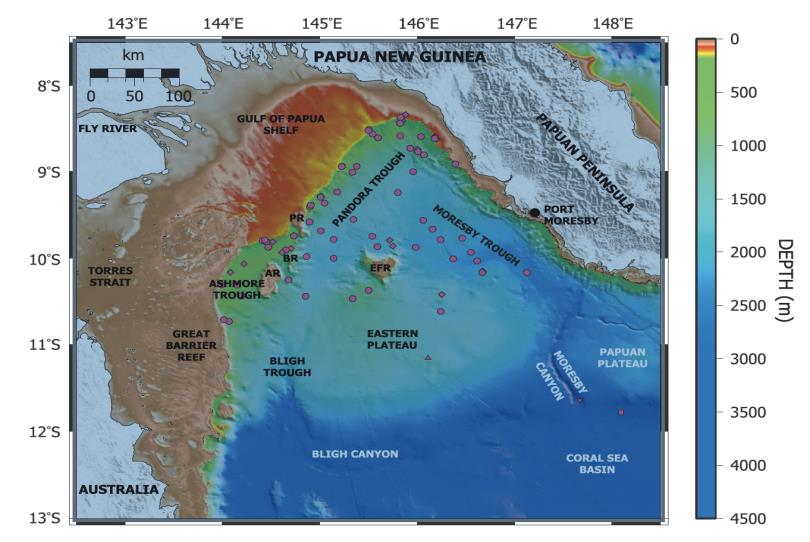Workshop on Scientific Ocean Drilling in the Gulf of Papua
Time: March 15 -17, 2023
Optional Field Trip: March 18
Location: Biosphere 2, Oracle, AZ
Workshop Steering Committee: Yair Rosenthal (Rutgers University), Luc Beaufort (CEREGE, France), Samantha Bova (San Diego State University), Larry Peterson (University of Miami), and Christina Ravelo (University of California, Santa Cruz)
Workshop Resources and Reports:
- Final Workshop Report (PDF)
This workshop aims to promote IODP research opportunities in the Gulf of Papua (GoP), which to date, has not been explored by scientific ocean drilling programs. The Gulf of Papua is uniquely situated to address key questions related to the evolution of Cenozoic climate. Located off the southeastern margin of Papua New Guinea (PNG), and within the rainy tropical region of the Indo Pacific Warm Pool (IPWP), the GoP receives unusually high volumes of siliciclastic sediments eroding from PNG, as well as large contributions of calcareous sediment transported from the northern part of the Great Barrier Reef (GBR) and PNG Barrier Reef, and offshore atolls (e.g., Ashmore and Eastern Fields). Research interests to be discussed in the workshop include but are not restricted to:
- Reconstruction of hydroclimate variability at the southeastern edge of the IPWP
- Source-to-sink studies to improve our understanding of the uplift of the Papuan fold belt
- Organic matter burial and diagenesis in a mixed sedimentary system
- Study of Oligocene/Neogene age large drowned carbonate platforms in the Pandora Trough and timing of the Ashmore and Eastern Fields Atoll formation
- Assessing the Mid-Brunhes timing and conditions that led to the inception and growth of the Great and PNG Barrier Reefs, the largest reef system in the world along mixed carbonate siliciclastic shelves
- Tectonic history of PNG
Our goal is to develop drilling proposals in this region that will address these and other key science questions. The workshop format will mix presentations related to the geology, oceanography and climatology of the GoP and reviews of prior studies in the region. These will be followed by breakout groups to discuss the objectives and hypotheses of the proposals and identify potential drilling sites.
Workshop Agenda – DRAFT
March 15, 2022
Morning
- Introduction of the host(s) and participants,
- Introduction to the new IODP “2050 Science Framework for Ocean Drilling” goals and challenges
- Introduction to the infrastructure and necessary requirements for submitting a successful IODP drilling proposal
- Keynote presentations:
- The geology of the Gulf of Papua
- The geology of PNG
- The Great Barrier Reef (GBR)
- Climate and oceanography of the WPWP
- Review of results from previous coring cruises in the GoP and Ocean Drilling programs in the region.
Afternoon
- Social time and Poster session
Evening
- Discuss the 5 key science questions presented in the proposal and any other objectives that that may be suitable
- Discuss possible themes for expeditions in the GOP, and the general target areas
- Chose initial theme leaders and identify potential drilling proposal proponents
March 16, 2022
Morning
- Introducing available academic (mainly 3.5 kHz) and industry seismic grids (MCS) and multiple well data available in in the GoP
Breakout groups
- Split up into working groups according to different themes/targets in GoP and GBR to discuss priorities and target sites.
- Developing goals and strategies for each of the potential drilling proposals
Afternoon
- Social time and outreach activity with local people (TBD)
Evening
Breakout groups
- Review available sites survey data and discuss/constrain best potential drilling sites
- Review proposed target sites and platforms for drilling
March 17, 2022
Morning
- Breakout group reporting on their discussions and make recommendations to be reviewed by the entire group
- Discussion of other open questions that can be addressed by new drilling proposals.
- Discuss potential land to sea program
- Start working on the workshop report to USAC and to the broad IODP community
Afternoon
- Plenary meeting summarizing the compiled results
- An open discussion on ways to (1) enhance mentoring opportunities of early career researchers (ECRs) by experienced senior IODP scientists and (2) promote diversity within in the ocean drilling community in relation to the 2050 mission statement
Evening
Closing dinner
March 18, 2022
Kayaking trip down the Llano River to visit some spectacular, world class Late Cambrian Microbial Reefs, a mixed carbonate siliciclastic system like the one we propose to drill in the GoP (optional).
The Gulf of Papua workshop will take place at the University of Arizona Biosphere 2 facility in Oracle, AZ, from Wednesday, March 15, 2023 through Friday, March 17 followed by an optional field trip on Saturday March 18 to Mt. Lemmon and Saguaro National Park.
We will invite ~20 US scientists and hope that a few more international scientists will join the meeting in person. We would like to include both senior scientists with experience working in this region and early career researchers who can advance these proposals in the future. This will allow for a generational transfer of knowledge with the hope that today’s early career scientists can be the leaders of the planned expeditions in the future.
Travel support is available from US Science Support Program (USSSP) for U.S.-based participants. International applicants should contact their program member offices and/or workshop organizer Luc Beaufort*. This workshop is funded by USSSP. The application period for this workshop is now closed.
Our goal is to invite a diverse participants group that includes a mix of senior and junior scientists with different levels of experience working with the IODP and with research interests in this region. We encourage applications from early career scientists and unrepresented groups.
Questions? Inquiries about the workshop can be sent to the organizers:
Yair Rosenthal, Rutgers University (rosentha@marine.rutgers.edu)
Larry Peterson, University of Miami (lpeterson@rsmas.miami.edu)
Luc Beaufort, CEREGE, France (beaufort@cerege.fr)







